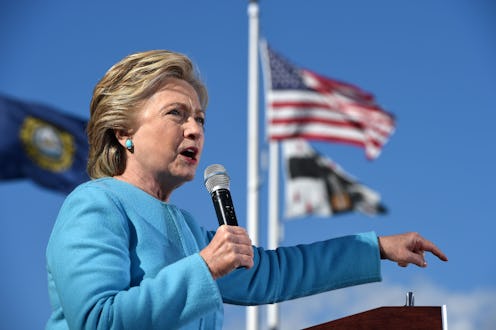News
Faithless Electors For Hillary Clinton Are Rare
Outside of government classes, the ins and outs of America's Electoral College system come up but once every four years during the presidential election. Questions are raised, laments put forth, the "fairness" of the process debated; most arguments surround the fact that some votes count more than others (that would be, swing state votes). But this year, another aspect of the electoral college system may write some headlines: that of "faithless electors." And there's been a lot of talk regarding Hillary Clinton's faithless electors.
When Americans vote in a presidential election, they are (with or without their knowledge) actually casting ballots for a number of state electors. These individuals are selected by their corresponding political parties, and are bound by precedent, pledge, and sometimes the law, to go on and vote according to the majority will of the people. In other words, Texas electors are expected to vote the same way as Texas citizens.
But that may change this year. One Democratic elector has already publicly threatened to refuse voting for Hillary Clinton. His name is Robert Satiacum Jr., an elector from Washington state. Satiacum is a member of the Puyallup Tribe, and is disappointed with Clinton's environmental policies. In an interview with POLITICO, he expressed deep personal conflict about supporting Clinton, rejecting the message that such a vote would send to his children and grandchildren, saying: "There's 16 souls that have the future ahead of them ... 16 other lives and souls I'm considering when I say 'no, I'm not going to vote for her.'"
On the Republican side, the prospect of voting for Donald Trump has caused at least one elector to step down. Baoky Vu, an elector in Georgia, resigned in August. Vu issued an official statement outlining the reason for his resignation, saying at one point:
Rather than earning the American people's respect and trust through the duration of the past year, Donald Trump's antics and asinine behavior has cemented my belief that he lacks the judgment, temperament and gravitas to lead this Nation.
There are few examples of "faithless electors" in U.S. history; none have impacted who the presidential winner turned out to be.
But to honor the great tradition of election hypotheticals, it is within the realm of possibility that Satiacum's non-vote for Clinton could change the election. If Clinton and Trump tied in electoral votes – 269 to 269 – that one missing Washington state vote would deprive Clinton of the necessary 270 majority, throwing the election to the House of Representatives. And if the House could not make a decision, the Senate would then vote between the vice presidential candidates, Tim Kaine and Mike Pence.
Satiacum's refusal to vote for Clinton has about a zero percent chance of ending in this scenario. But if he sets off a trend, widespread electoral rebellion would absolutely impact election results. As of now, there is no indication that anyone else plans on joining Satiacum in abstaining from their electoral vote. Lovers of the electoral college system should feel relieved.
